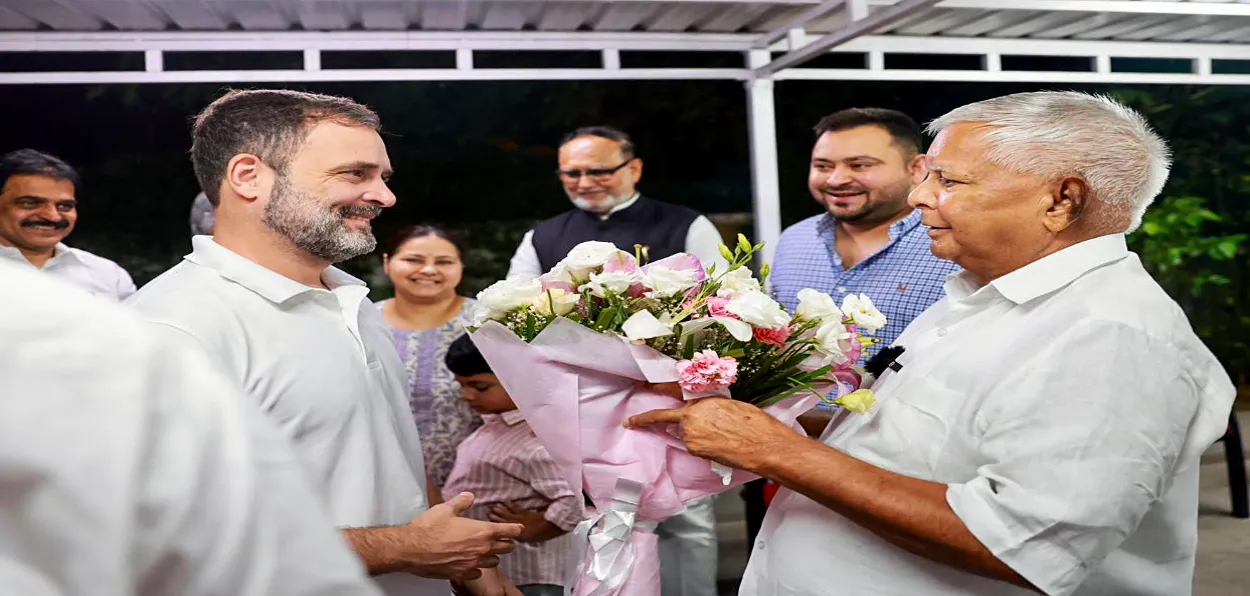
Shekhar Iyer
The Supreme Court's big relief to Rahul Gandhi by staying his conviction in a defamation case is just not about his re-entry into Parliament. Rather, it changes the dynamics within the Congress party as well as among the Opposition alliance partners, bringing him back to the forefront of the next Lok Sabha elections in 2024.
News Analysis
A “Rahul versus Modi” fight may again dominate the narrative, much to the advantage of Prime Minister Narendra Modi as it happened in 2014 and 2019.
This is not something the Opposition would want because its leaders believe it would only benefit the BJP.
Rather, they might prefer that he remains backstage, leaving the current initiative to Malikarjun Kharge, who is the Congress president and other Opposition leaders including Mamata Banerjee, Nitish Kumar, Sharad Pawar, M K Stalin, and Arvind Kejriwal.
However, the rank and file of the Congress would want Rahul to take centerstage again. They won't like him to appear to play second fiddle to Kharge or his mother, Sonia Gandhi -- when he is seen as the authority.
Of course, his taking the centerstage again may upset the calculation of other Opposition leaders like Mamata Banerjee and others who are opposed to him as the prime minister (PM) face of their front.
In a bid to assuage their fears and present himself as a self-seeking leader, Rahul may declare that he would be like Sonia Gandhi. He will work to revive Congress and not seek the top job in 2024.
Buffeted by circumstances and opposition from leaders like Sharad Pawar in 2004, Sonia Gandhi appointed Dr Manmohan Singh as PM. At that time, even Rahul was said to have opposed her becoming PM.
This time, his loyalists in the Congress party would not like Rahul to do the same in the event of the Congress-led alliance being in striking distance of forming an alternative to Modi.
Of course, all the focus is now on how quickly his membership of the Lok Sabha will be restored and he can take part in the Opposition’s no-confidence motion against the government on August 8.
On August 21, the Sessions Court in Surat will hear his appeal against the ruling that had convicted him and sentenced him to two years in prison.
We need to understand the background of the case. Rahul would do well not to fall into such controversies in the future.
On April 13, 2019, while Rahul was campaigning for the Lok Sabha elections, he had told a rally in Kolar, Karnataka, that “Why do all thieves, be it Nirav Modi, Lalit Modi, or Narendra Modi, have the surname ‘Modi’?”
He was said to be alluding to the fugitive businessman Nirav Modi and the former cricket administrator Lalit Modi, both of whom face allegations of financial fraud. Aday after Rahul’s speech, Purnesh Modi, a Gujarat BJP leader, and former state minister, filed a private complaint before the Chief Judicial Magistrate, Surat, accusing Rahul of having defamed everyone with the name Modi.
On March 23, 2023, Magistrate H H Verma found Rahul guilty of criminal defamation under IPC Section 500 and gave him the maximum sentence allowed under that section, which is two years in jail.
This decision by the trial court triggered Section 8(3) of The Representation of the People Act, 1951, which states: “A person convicted of any offense and sentenced to imprisonment for not less than two years shall be disqualified from the date of such conviction and shall continue to be disqualified for a further period of six years since his release.” So, on March 24, the Lok Sabha Secretariat issued a notification saying that Rahul stood disqualified from the House with effect from March 23, the date of his conviction.
On April 3 this year, Rahul moved to the next higher court, the Surat Sessions Court, on appeal. He filed two applications, one for the suspension of the two-year sentence, and the other for the suspension of conviction.
On April 20, Additional Sessions Judge R P Mogera rejected both applications. Rahul then moved the Gujarat High Court in appeal. On July 7, Justice Hemant Prachchhak dismissed the appeal and said that the sessions court order refusing to grant a stay on his conviction earlier was “just and legal.”
Rahul then moved the Supreme Court, which on August 4, stayed the conviction while observing that nobody knows why the trial judge decided to serve him with a two-year prison sentence, the maximum punishment for the offense of criminal defamation. A Supreme Court Bench headed by Justice B.R. Gavai said there is no clue about it in the trial judge’s verdict. “The least the trial judge was expected to do was to give some reasons as to why he found it necessary to impose the maximum sentence of two years,” the Supreme Court observed in its four-page order. Neither does the Gujarat High Court, despite spending “voluminous pages” confirming the two-year sentence of the trial judge, look for reasons.
The Bench noted that “disqualification not only affects the rights of the individual but also that of the electorate he represents in the Parliament… the ramifications are wide.”
What Rahul or the Congress must not forget is that the Supreme Court also held that Rahul’s remarks were “not in good taste.” It observed that “a person in public life is expected to exercise a degree of caution while making public speeches… The petitioner ought to have been more careful."
ALSO READ: J&K's renaming with Art 370 removal ended 72 years of chaos, confusion
The Bench reminded Rahul of how it had advised him to be more careful in the future with his public utterances while accepting his apology for his “chor” remarks during the previous general elections.
Shekhar Iyer is a New Delhi-based senior journalist
